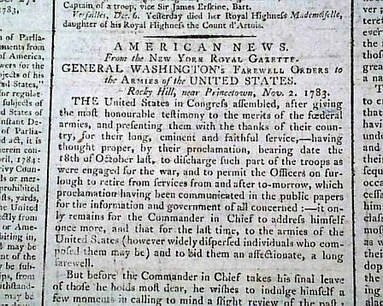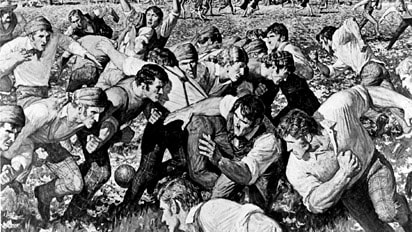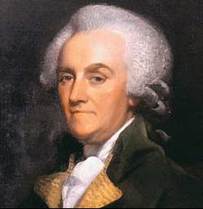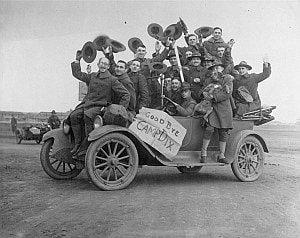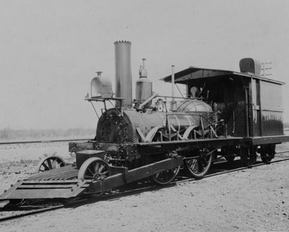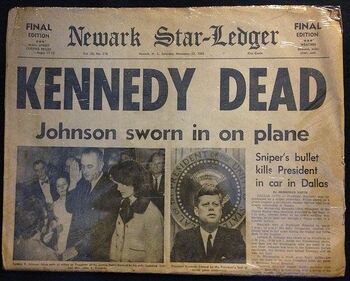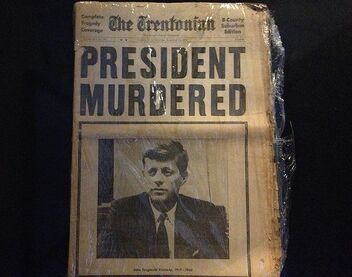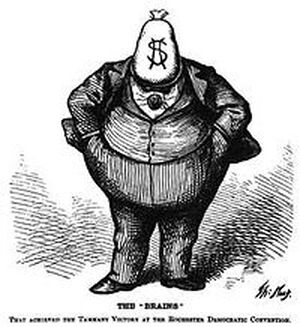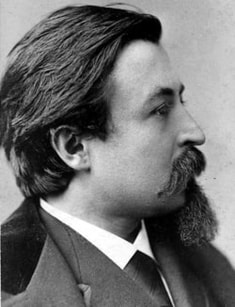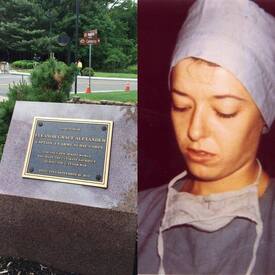-- New Jersey History Timeline - November
* January * February * March * April * May * June * July
* August * September * October * November * December
* Home
|
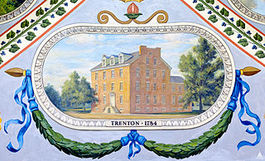
On November 1 of 1784 The Continental Congress meets at the French Arms Tavern in Trenton and would continue its session until adjourning on December 24, subsequently re-convening in New York City On November 2 of 1783
General George Washington issues his "Farewell Orders to the Armies of the United States" from his headquarters in Rocky Hill, just north of Princeton in what is now a section of Franklin Township in Somerset County. On November 3 of 1926
The trial begins in the Somerset County Court House in Somerville in the Hall–Mills murder case. The case involved the murders in 1922 in Somerset of an Episcopal priest and a married woman who was a member of his choir with whom he was having an affair. The priest's wife and her brothers were acquitted in the month-long trial and no one else is ever convicted of the murders. On November 4 of 2001
New Jersey native and Rutgers alumnus James Gandolfini wins his second Emmy Award as Outstanding Lead Actor in a Drama Series for his portrayal of Tony Soprano in The Sopranos. The ceremony is held after being re-scheduled from its original date of September 16 due to the September 11 terrorism attacks. 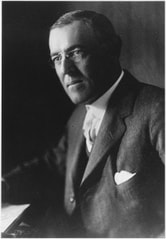
On November 5 of 1912
New Jersey Governor Woodrow Wilson, the Democratic nominee, is elected president, receiving 42% of the popular vote, defeating the Progressive Party candidate and former President Theodore Roosevelt with 27%, incumbent Republican President William Howard Taft with 23% and the Socialist Party's Eugene Debs with 6%. On November 5 of 1951 The New Jersey Turnpike opens to traffic, with the first toll paid at Interchange 2 at 8:10 a.m. |
|
|
On November 15 of 2004 Governor James E. McGreevey's resignation is effective. He had announced his intention to resign at an appearance in the State House on the previous August 4 during which he stated, "My truth is that I am a gay American." McGreevey is succeeded by Senate President Richard Codey, who serves concurrently in the Senate and as Acting Governor under the process then in effect under the state Constitution. |
On November 16 of 2006
Milton Friedman, Nobel Prize winning economist who spent his youth in Rahway and was an alumnus of Rutgers University in the Class of 1932, dies at the age of 94.
Milton Friedman, Nobel Prize winning economist who spent his youth in Rahway and was an alumnus of Rutgers University in the Class of 1932, dies at the age of 94.
On November 17 of 1944
Daniel Michael "Danny" DeVito, later a prominent actor, director and producer who received Emmy and Golden Globe awards for his acting in the television series Taxi, is born in Neptune.
Daniel Michael "Danny" DeVito, later a prominent actor, director and producer who received Emmy and Golden Globe awards for his acting in the television series Taxi, is born in Neptune.
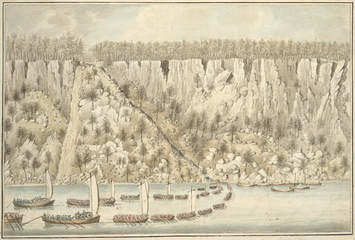
On November 18 of 1776
Continental Army troops, after the British seize Fort Washington in New York, escape by ship to cross the Hudson to Fort Lee.
Continental Army troops, after the British seize Fort Washington in New York, escape by ship to cross the Hudson to Fort Lee.
On November 19 of 1850
The first life insurance policy issued to a woman is bought by 36-year-old Carolyn Ingraham of Madison.
The first life insurance policy issued to a woman is bought by 36-year-old Carolyn Ingraham of Madison.
On November 20 of 1776
British and Hessian troops cross the Hudson River to attack the Continental Army at Fort Lee, forcing its retreat south across New Jersey.
British and Hessian troops cross the Hudson River to attack the Continental Army at Fort Lee, forcing its retreat south across New Jersey.
On November 21 of 1776
George Washington writes a letter to General Charles Lee stationed in Westchester County in New York to report the loss of Fort Lee and order Lee to bring his forces to New Jersey. Lee delays following the order, and when he does arrive in New Jersey is soon taken prisoner by the British when he visits a tavern in Basking Ridge, apparently to seek comfort from a prostitute. The incident is one of a series of conflicts which eventually leads to Lee's termination from the military.
George Washington writes a letter to General Charles Lee stationed in Westchester County in New York to report the loss of Fort Lee and order Lee to bring his forces to New Jersey. Lee delays following the order, and when he does arrive in New Jersey is soon taken prisoner by the British when he visits a tavern in Basking Ridge, apparently to seek comfort from a prostitute. The incident is one of a series of conflicts which eventually leads to Lee's termination from the military.
On November 22 of 1963
President John F. Kennedy assassinated in Dallas. New Jersey governments and businesses close during mourning period through Kennedy funeral on November 25.
President John F. Kennedy assassinated in Dallas. New Jersey governments and businesses close during mourning period through Kennedy funeral on November 25.
|
On November 23 of 1876 New York City's Tammany Hall Democratic political boss William "Boss" Tweed is transferred to authorities in New York and returned to prison following his escape to Spain to avoid standing trial in a civil suit seeking recovery of millions in funds from alleged illegal kickbacks and embezzlement. A key factor in Tweed's downfall was the series of caricatures published in Harper's Weekly drawn by Thomas Nast, who relocated to Morristown from New York in 1870, depicting the corruption of the Tweed Ring. |
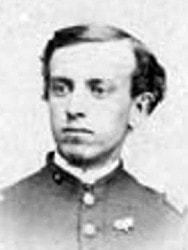
On November 23 of 1863
During Battle at Missionary Ridge at Chattanooga, Tennessee, Lt. John Toffey of 33rd New Jersey regiment is wounded and awarded the Medal of Honor for heroism. Toffey was later present at Ford’s Theater on the night of April 14, 1865, when President Abraham Lincoln was assassinated. After the war he served two terms as Hudson County sheriff, served as state treasurer of New Jersey from 1875 to 1891, as an alderman of Jersey City, and was elected as a member of the New Jersey State Legislature.
On November 24 of 1781
James Caldwell, pastor of the Presbyterian Church in Elizabethtown and active revolutionary who fought in the Battle of Springfield and became known as the "Fighting Parson," is killed by an American sentry when he refused to have a package inspected. The sentry was hanged two months later in Westfield for murder.
On November 25 of 1950
Along with most of the Northeast, what becomes known as the Great Thanksgiving Storm strikes New Jersey,
with wind gusts of 108 miles per hour in Newark and extensive coastal flooding.
|
On November 26 of 1971 A riot breaks out at Rahway State Prison with the warden and some guards taken hostage. The prison is re-taken by police without any deaths. |
|
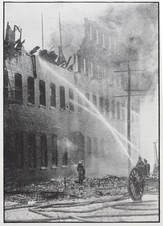
On November 26 of 1910
A fire breaks out in a Newark factory building with predominantly young women workers, resulting in six girls burning to death and nineteen others killed leaping to the street from fourth-story windows. The building is later found to have inadequate fire escapes, exit passages and other safety precautions.
A fire breaks out in a Newark factory building with predominantly young women workers, resulting in six girls burning to death and nineteen others killed leaping to the street from fourth-story windows. The building is later found to have inadequate fire escapes, exit passages and other safety precautions.
|
On November 27 of 1777
New Jersey Militia General Philemon Dickinson leads a force of 1,400 militiamen in a raid on Staten Island and captures 200 men of the Loyalist New Jersey Volunteers, most of them recently recruited in Bergen County. |
|
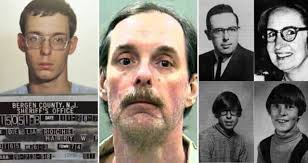
On November 28 of 1976
Harry de la Roche, an 18-year-old freshman college student at The Citadel, shoots and kills his mother, his father, and his two younger brothers while he is at home in Montvale for the Thanksgiving holidays. After his conviction by a jury of murder, he is sentenced to four concurrent terms of life in prison.
|
On November 29 of 1877
Thomas Edison gives the first public demonstration of his tin-foil phonograph, speaking into a tube and playing back: "Mary had a little lamb. Its fleece was white as snow. And everywhere that Mary went, the lamb was sure to go!" The phonograph was developed at his laboratory in Menlo Park (current Edison Township) in Middlesex County. |
|
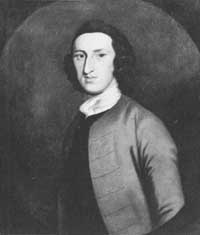
On November 30 of 1723
William Livingston is born in Albany in the British Province of New York. After relocating to New Jersey, Livingston would serve as the first governor of the state of New Jersey, elected to 13 successive one-year terms by the legislature until dying in office in 1790. '
William Livingston is born in Albany in the British Province of New York. After relocating to New Jersey, Livingston would serve as the first governor of the state of New Jersey, elected to 13 successive one-year terms by the legislature until dying in office in 1790. '
* January * February * March * April * May * June * July
* August * September * October * November * December
